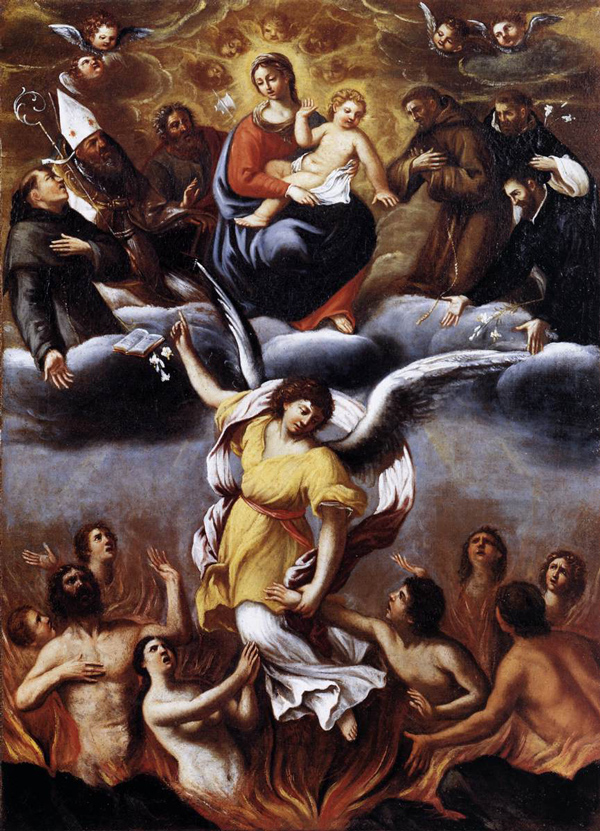
The Purgatory Society meets on the fourth Monday of every month at St. Michael Church in Garden City.
People who attend pray the rosary and attend Mass specifically to supplicate for the souls in purgatory.
The society was started by Father Edward Fitzgerald, the pastor, because he’s had a special devotion to prayer for those in purgatory since childhood.
Purgatory is something most Catholics have heard about all their lives. We’re often told to pray for the souls there, especially around the season of All Souls’ Day in early November.
Few people, however, know much about the actual concept. Is it a physical place? A state of being? Or something in between?
Here are some basic facts about purgatory and why it is an important doctrine:
What does the word mean?
Purgatory comes from the Latin word purgare, meaning to make clean or purify.
What is the Church teaching on purgatory and from where does it come?
Purgatory is described in the Catechism as a place where souls may go through final purification before entering heaven. It states: “All who die in God’s grace and friendship, but still imperfectly purified, are indeed assured of their eternal salvation; but after death they undergo purification, so as to achieve the holiness necessary to enter the joy of heaven.” (1030)
The Catechism goes on to say that the Church formulated the doctrine of purgatory at the Councils of Florence, held from 1431-1449; and Trent, which lasted from 1545-1563.
The idea of a final purification comes from Scripture passages which refer to cleansing fire. There are many of these, including a vivid image in St. Paul’s first letter to the Corinthians. He refers to how the work of each person during their lives will be revealed and tested through divine fire.
“But if someone’s work is burned up, that one will suffer loss; the person will be saved, but only as through fire.” (1 Cor. 3: 15).
How long do souls stay in purgatory and what kind of place is it?
There is no specific amount of time as we know it here on Earth. According to Church teaching and tradition, souls remain in the state of purgatory until they have undergone sufficient purification to be able to stand before God in heaven.
Purgatory, heaven and hell are most easily described as places when we talk about them, but it is important to recognize they are not physical places like locations on earth.
“It’s perhaps most helpful to think of purgatory as a state of being,” said Thomas Humphries Jr., assistant professor of philosophy, theology and religion at St. Leo University in Florida. “It’s a state of being and a process that souls are going through so they can become so radically transformed that they will be able to behold God face to face.”
What exactly goes on in purgatory?
Trying to come up with an idea of what purgatory is like is hard because we aren’t given a specific image.
No Church teaching has ever specifically addressed what process souls go through in purgatory, except to state that it is one of purification.
Some Church fathers, including St. Gregory the Great and St. Thomas, conjured up scary images. They wrote of souls going through temporal punishment that involved “purgatorial flames” that caused great pain. St. Thomas also indicated that part of the souls’ punishment was simply being separated from God. The true nature of the punishment and purification, however, has never been described.
More modern writings about purgatory, on the other hand, can leave you wondering if it isn’t more like one of those boring doctor’s waiting rooms with outdated magazines.
When trying to explain the state of purgatory in layman’s terms, Father Fitzgerald said he likes to use the image of arriving at a hotel with a reservation guaranteed with a credit card, but the room is not ready.
In a similar light, teaching on purgatory stresses that souls there are guaranteed a place in heaven, but are not yet ready and must wait for that place to open up for them. Their purification takes place during that waiting period.
Why are we asked to pray for the souls in purgatory?
The Catechism (1032) notes that teaching on purgatory is based on the traditional practice of prayer for the dead, also mentioned in Scripture.
One of the core Scripture passages is 2 Macc 12:38-46, according to Humphries. He said these passages describe Judas Maccabeus praying for and making atonement for the dead so they can be absolved from sin.
“Prayers for the dead receive very early description within Christianity and are also discussed by a number of the church fathers,” he said. “The content of the teaching on purgatory, that praying for the dead is important and our God is a purifying God, has been a part of Christianity from the beginning.”
Besides prayer for the souls in purgatory, the Catechism also encourages everyone to help them by performing works of charity and penance on their behalf.

